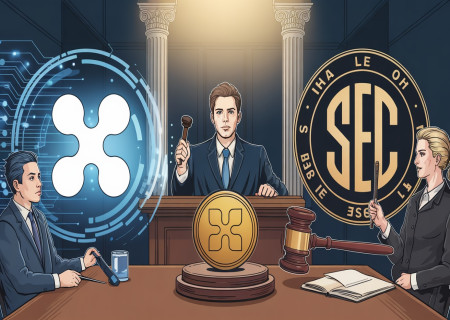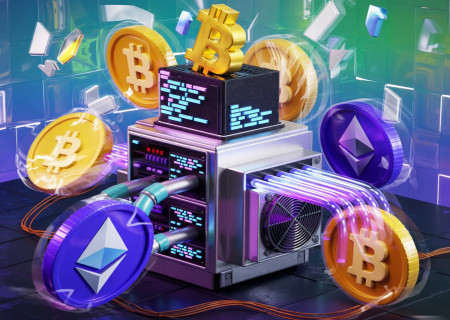
- April 21, 2025
- 9 months ago
XRP Lawsuit: Expert Reveals Hurdles For Ripple And The SEC Ahead Of Final Resolution
Summary
The court battle between Ripple Labs and the U.S. Securities and Exchange Commission (SEC) has been one of the most widely debated cases in the world of cryptocurrency. It began in December 2020 when the SEC brought suit, charging that Ripple's sale of its digital token, XRP, was an unregistered securities offering. Ripple argues, though, that XRP is not a security but a cryptocurrency, like Bitcoin or Ethereum, and that it is not subject to the SEC.
This case is hugely important because it could potentially change how cryptocurrencies are regulated in the United States. If the court is to go along with the SEC and rule that XRP is a security, then hundreds of other crypto tokens would potentially be deemed securities in the future. This would mean tighter controls, additional government intervention, and perhaps inhibiting crypto development. If, on the other hand, Ripple wins, there could be increased freedom for crypto companies and easier guidance on operating and selling virtual tokens legally.
Throughout the case, Ripple has contended that the laws were unclear when XRP came out and that the company never intended to break any rules. The SEC believes that Ripple broke the law knowingly. Both parties have good points, and the case may still settle or end in a final verdict.
Introduction
The ongoing case of Ripple vs. the U.S. Securities and Exchange Commission (SEC) has been one of the most popular legal cases within the crypto sector. The gist of this matter is whether or not XRP, a digital asset created by Ripple Labs, is a security. The SEC has argued that XRP qualifies as a security and, as such, must be handled similarly to stocks and bonds. Ripple has, however, strongly objected and maintained that XRP is a digital asset like Bitcoin or Ethereum, and therefore should not be regulated by the SEC.
The outcome of this case has profound implications not only for Ripple but also for the general cryptocurrency market. If the court holds in favor of the SEC, it may prove disastrous to Ripple, and the firm will be forced to shell out heavy penalties and alter its business operations. It could also set a precedent that goes to other digital currencies, which would be forced to comply with rigorous securities regulations. Concurrently, if Ripple won, it would most certainly be a thunderous victory for the crypto market, allowing digital currencies to engage in commerce with even more autonomy.
With the case's eventual outcome approaching, several hurdles must be overcome by both the SEC and Ripple. Legal analysts have commented on the fact that the case is intricate, involving many technical as well as legal concerns. Ripple has to persuade the court that XRP is not a security, and the SEC must demonstrate the opposite. The court's verdict could determine America's and perhaps the world's future of cryptocurrency regulation. Businesses, investors, and the entire crypto community have their eyes keenly on the case because the verdict might greatly impact the sector.
With so much hanging in the balance, both the SEC and Ripple have a rough road ahead of them. Ultimately, it might take months or even years to determine the case's outcome, and nobody knows how the court will rule. All said, however, everybody concurs that the case will be the game-changer for the crypto regulatory environment that it promises to be and possibly pave the way for more granular guidelines in the future on digital assets.
Table of Contents:
- Will Ripple’s legal battle with the SEC set a precedent for future cryptocurrency regulations?
- How could the SEC's stance on XRP impact the broader cryptocurrency market?
- Is Ripple likely to win the lawsuit, considering the legal complexities surrounding securities laws?
- What are the key hurdles that Ripple must overcome in its defense against the SEC?
- Can the SEC establish that XRP is a security despite Ripple's argument to the contrary?
- Will the court ruling on XRP’s classification affect other digital assets and tokens in the U.S.?
- How might Ripple’s compliance efforts with the SEC influence the outcome of the case?
- Is there a possibility of a settlement between Ripple and the SEC before the final judgment?
- Conclusion
- Frequently Asked Questions (FAQ's)
Will Ripple’s legal battle with the SEC set a precedent for future cryptocurrency regulations?
Ripple's battle in the courts with the SEC could set a very important precedent for the future regulation of cryptocurrencies. If the court rules that XRP is indeed a security, then other cryptocurrencies would be forced to conform to strict rules like stocks and bonds.
This would provide a stronger model for regulating cryptocurrencies in the U.S. Or, if Ripple wins the lawsuit, it will be able to prove that the digital currencies need to be handled differently from regular financial assets.
This ruling might have an impact on how future cryptocurrencies are given consideration and treated, affecting the industry in general. Therefore, the outcome of this case is likely to determine how cryptocurrency law and regulation are going to alter in the future.
How could the SEC's stance on XRP impact the broader cryptocurrency market?
The SEC position on XRP would also extend deeply into the overall cryptocurrency universe. If the SEC prevails and XRP is considered to be a security, it would also mean other cryptocurrencies would also have to be bound by stiff regulations, such as registering at the SEC and satisfying certain lawful conditions.
This could also become harder for new coins to begin and operate in the U.S. But if Ripple wins, it will maybe give freedom to other coins to break free from draconian rules.
The SEC decision might also impact how investors view cryptocurrencies and can result in them taking a more cautious or further investing approach, depending on the outcome. Overall, the case could decide the future growth and regulation of the overall cryptocurrency market.
Is Ripple likely to win the lawsuit, considering the legal complexities surrounding securities laws?
It is hard to determine with certainty whether Ripple will win the case, given the intricacies of law at stake. The case is problematic as it concerns whether XRP is a security, which is subject to complex provisions in securities legislation.
Ripple thinks that XRP is akin to Bitcoin or Ethereum, neither of which is are security, yet the SEC holds the opinion that it is a security. Since there is no clear law governing how to handle cryptocurrencies like XRP, the court's verdict can go either way.
But Ripple does have solid grounds for law, and most believe that the case can go its way. But as of yet, the outcome isn't sure and it can take some time to find out what the court's decision will be.
What are the key hurdles that Ripple must overcome in its defense against the SEC?
Ripple has several key challenges to its defense of the SEC charges:
- Producing XRP is Not a Security: Ripple's biggest challenge is to persuade the court that XRP is not a security, as the SEC alleges. The SEC argues that XRP qualifies as a security because it was offered for sale to investors on the promise of profit, one of the chief elements of securities law.
- Legal Precedents: Ripple would be forced to slash its way through existing legal precedents that have been set for traditional securities. The court would be able to apply these past decisions to decide the treatment of XRP, making Ripple's case more difficult.
- The 'Howey Test': Ripple needs to prove that XRP fails the test set by the "Howey Test," which is a judicial test for ascertaining whether a thing is a security. The test looks for investment of money in a common enterprise for profit. Ripple needs to plead that XRP fails these requirements.
- Ripple's Previous Sales: Ripple is also compelled to counter the SEC's allegation that the company sold XRP in the past as an unregistered security. The SEC is emphasizing Ripple's previous sales of XRP, claiming that they were sold without registration and contrary to securities laws.
- Regulatory Clarity: Ripple has to persuade the court that there was insufficient clear regulation of the cryptocurrency space when XRP entered. This could be used to deflect that Ripple did not knowingly violate any laws because the regulatory landscape for digital currencies was unclear.
- Effect on Investors: Ripple will have to prove that XRP was not sold to give investors returns that result from Ripple's efforts. This matters because securities law is most likely to apply when returns to investors are based on a company's efforts, which Ripple will have to dispute is not the case with XRP.
Can the SEC establish that XRP is a security despite Ripple's argument to the contrary?
The SEC may be able to show that XRP is a security, but it has strong hurdles to get over in doing so even if Ripple begs them to. The SEC would need to be capable of showing that XRP falls under the "Howey Test" criteria, which determines whether or not an asset is a security based on criteria such as whether money is being put in with expectations of profit from the work of others.
Ripple contends that such standards are not met by XRP since XRP operates similarly to Bitcoin or Ethereum and is not a security. However, the SEC will certainly pursue Ripple's historical sales of XRP and how these sales were sold to investors, being able to plead that investors inferred profit from what Ripple did.
Ultimately, the court will have no choice but to balance both arguments and determine whether or not XRP is a security under current securities law. While Ripple's position is solid, the SEC case also has prior cases out of the courts to stand behind, so the decision is anything but assured.
Will the court ruling on XRP’s classification affect other digital assets and Tokens in the U.S.?
In fact, the court ruling on the designation of XRP has broader implications for other virtual assets and tokens in the US. If the court rules XRP is a security, then this could be a legal precedent that would guide how other cryptos are viewed as part of US securities legislation.
This might imply that other virtual assets would also be securities and their issuers would have to abide by stringent regulations, including registration with the SEC and adherence to investor protection laws.
Conversely, if Ripple loses and XRP is a security, it might enable other cryptocurrencies to escape the same degree of regulation, opening up opportunities for innovation and development in the crypto space.
How might Ripple’s compliance efforts with the SEC influence the outcome of the case?
Ripple's attempt to satisfy the SEC may be the determinant of the success or failure of the case. If Ripple can establish that it did make good-faith efforts to comply with the existing rules in place, it would strengthen its case. For example, Ripple has argued that the regulatory landscape in terms of cryptocurrencies was not clear when XRP was launched, and that could hold in proving that they did not violate securities laws intentionally. If the court believes that Ripple tried to comply with regulations, it will be more forgiving towards the company.
Alternatively, the SEC can argue that Ripple acted intentionally, particularly if it discovers evidence that Ripple deliberately ignored securities law while offering XRP for sale. Yet, Ripple's good faith in agreeing to work with the SEC in trying to clear up its position and to comply in the future might be evidence that it is indeed trying to comply with legal limits. The court may consider this while deciding on whether Ripple has acted in good faith and whether or not there should be a penalty.
Finally, Ripple's attempt at compliance could strike a chord with the attitude of the court towards the case, perhaps towards a lesser sentence or on the amount of penalty that can be imposed. Perhaps it will even make a difference in the wider public discussion on how future regulation of cryptocurrencies should be done.
Is there a possibility of a settlement between Ripple and the SEC before the final judgment?
Yes, there is indeed a possibility of a settlement between Ripple and the SEC before the final judgment. Indeed, the majority of legal pundits believe that a settlement is likely, considering how long the case has gone on so far and how much is at stake for both parties. A settlement would allow Ripple to avoid the risk of an unfavorable court ruling and allow the SEC to gain some form of penalty or regulatory guarantee without requiring a full trial outcome.
Settlements are standard in complex legal cases like this one because they can save time, legal costs, and uncertainty for both parties. If Ripple accepts certain terms—like paying a fine, modifying its business practices, or agreeing to future compliance—the SEC would be willing to settle. In the meantime, Ripple may wish to settle so that it will not pursue additional litigation and will maintain its reputation and business.
Whether or not there is a settlement will depend, however, on how far apart the parties are from each other's positions.If neither side is willing to move on key issues—like whether XRP is a security—then the case may go all the way to a final court decision. But with the increasing pressure and possible industry-wide effect, a settlement remains a realistic and sensible possibility.
Conclusion
The Ripple vs. the U.S. Securities and Exchange Commission (SEC) legal battle is perhaps the most important and highly covered case in the international world of cryptocurrency. It's not just about XRP—it's about whether or not digital assets are to be classified as such in U.S. law. The decision of this case will determine the future of the entire crypto market, particularly in the United States. If the court decides that XRP is a security, numerous other cryptos will also be following and will be regulated strictly as well. But if Ripple succeeds, it may introduce more freedom and innovation to the crypto market.
Ripple has maintained the stance throughout the case that XRP is not a security and could not have been treated as one. It says regulators provided no definitive guidance for introducing XRP and that the firm did the best it could within the law. The SEC, however, is certain that Ripple broke securities laws by selling XRP without registering it. Both sides have strong arguments, and the case has raised a multitude of thorny legal issues, such as whether or not to apply centuries-old statutes to new technologies like blockchain and digital tokens.
There are still many possibilities to come. Ripple could win the case, the SEC could win, or the two could settle before the final decision. A settlement could be an acceptable means of resolving the case without additional delays and legal expenses. Ripple's attempt to cooperate with the SEC and follow the rules could be beneficial to its defense, but the court will also scrutinize closely whether XRP is a security according to the legal definition.
Frequently Asked Questions (FAQ's)
Que: What is the Ripple vs. SEC case all about?
Ans: The SEC filed a suit in December 2020 against Ripple Labs for allegedly selling the XRP company's token as an unregistered security. Ripple holds the stance that XRP is a form of digital money like Bitcoin, and not a security.
Que: Why does this case matter to the crypto space?
Ans: This case has the potential to set a judicial precedent for the regulation of cryptocurrencies in the U.S. If XRP is defined as a security, many other tokens would face similar legal issues.
Que: What is XRP?
Ans: XRP is a virtual currency created by Ripple to facilitate quick and affordable cross-border money transfers between banks and financial institutions.
Que: What does the SEC want from Ripple?
Ans: The SEC is requesting that Ripple be held responsible for selling XRP without having it registered as a security. It is also seeking monetary fines and potentially an injunction on future sales of XRP.
Que: Is the court's ruling final?
Ans: There has not yet been any ultimate decision. The case is still pending, and both parties keep presenting their arguments. A partial summary judgment in 2023, though, was considered a partial win for Ripple.




